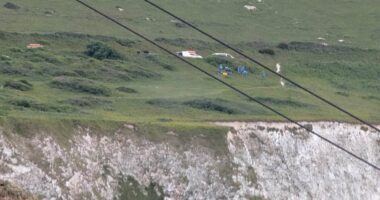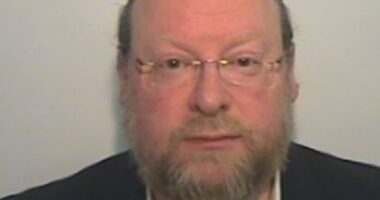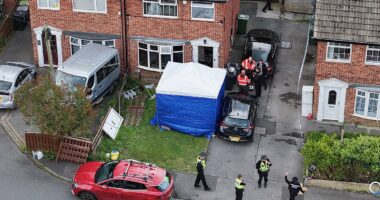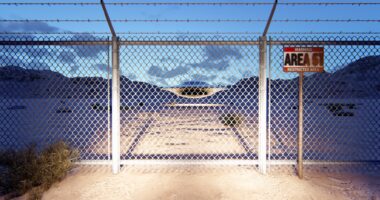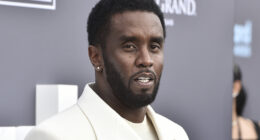Nato’s chief is heaping pressure on Keir Starmer to agree a huge boost in defence spending today.
Mark Rutte has been holding talks with the PM in London, and gave a speech warning of the need for a ‘quantum leap’ in investment.
After pressure from Donald Trump, states are expected to be asked to agree to commit 3.5 per cent of GDP by the 2030s at a summit later this month. A further 1.5 per cent would be required for defence-related measures.
However, there are questions about how the UK would fund such a huge increase – roughly equivalent to an extra £30billion annually.
Britain allocated 2.33 per cent of GDP to defence last year, and Sir Keir has committed to reaching 2.5 per cent by April 2027.

Mark Rutte has been holding talks with the PM in London, and gave a speech warning of the need for a ‘quantum leap’ in investment
The government has an ‘ambition’ of increasing that to 3 per cent in the next parliament – likely to run to 2034.
As the two leaders met in No 10’s White Room this afternoon, Sir Keir said: ‘We see Nato as the cornerstone of our defence. The most effective military alliance the world has ever seen, as has been proven over 80 years.’
Speaking about the upcoming Nato summit, Sir Keir added: ‘The task of the summit obviously is to make sure that for decades to come it serves exactly that same purpose.’
Mr Rutte said: ‘I want to commend you for the strategic defence review. It is really very good stuff.
‘It is not only about the traditional things, of course we need them, like ammunition… there is also drones, innovation, building the defence industrial base. It is really broad, it is really making a big impression in Brussels I can tell you.’
Mr Rutte used a speech at London’s Chatham House later to say a ‘400 per cent increase in air and missile’ capability is required just to maintain deterrence and defence.
He said ‘wishful thinking will not keep us safe’ as he warned Nato must become a ‘stronger, fairer and more lethal alliance’ to protect itself.
Mr Rutte said: ‘The fact is, we need a quantum leap in our collective defence. The fact is, we must have more forces and capabilities to implement our defence plans in full.
‘The fact is, danger will not disappear even when the war in Ukraine ends’.
He added: ‘We see in Ukraine how Russia delivers terror from above, so we will strengthen the shield that protects our skies.
‘Our militaries also need thousands more armoured vehicles and tanks, millions more artillery shells, and we must double our enabling capabilities, such as logistics, supply, transportation and medical support.’
On threats against the alliance, Mr Rutte said: ‘Wishful thinking will not keep us safe. We cannot dream away the danger.
‘Hope is not a strategy. So Nato has to become a stronger, fairer and more lethal alliance.’
Mr Rutte said: ‘At the summit in the Hague, I expect allied leaders will agree to spend 5 per cent of GDP on defence. It will be a Nato-wide commitment and a defining moment for the alliance.
‘There are two parts to this new defence spending plan: 3.5% will be invested in our core military requirements, the rest will go towards defence and security-related investments, including infrastructure and building industrial capacity.
‘5 per cent is not some figure plucked from the air. It’s grounded in hard facts.
‘The fact is we need a quantum leap in our defence. The fact is we must have more forces and capability to implement our defence plans in full.’
The US itself missed the proposed target by spending 3.38 per cent of GDP on defence last year – although the sheer size of its economy meant that dwarfed contributions from the rest of the alliance.
Countries such as Germany face finding upwards of $60billion a year more for the military.


Sir Keir (pictured in London today) has insisted the UK makes a major contribution to Nato
The increase in Italy would be equivalent to around $46billion, Canada $45billion, France £44billion and the UK roughly $40billion.
Spain – which has not invested heavily in defence up to now – could need to allocate an additional $36billion despite its economy being much smaller.
The UK’s Strategic Defence Review, published last week, recommended sweeping changes, including a greater focus on new technology, including drones and artificial intelligence based on rising budgets.
The boost to the defence budget will be confirmed by Chancellor Rachel Reeves in her spending review on Wednesday, when she will set out the Government’s priorities for the next three years.




